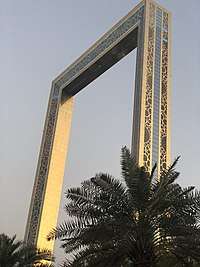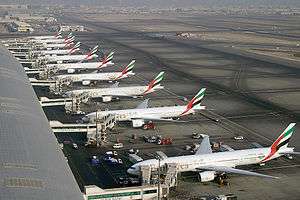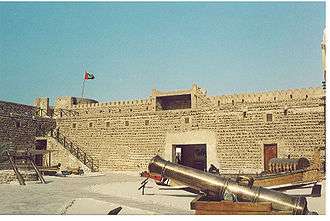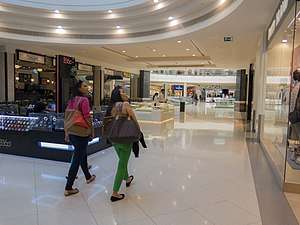Tourism in Dubai
Tourism in Dubai is a part of the Dubai government's strategy to maintain the flow of foreign cash into the emirates. In May 2013, the government of Dubai launched the Dubai Tourism Strategy 2020, with the key objective to attract 20 million visitors a year by 2020 and making Dubai a first choice destination for international leisure travellers as well as business travellers.[1] In 2018, the strategy was expanded by setting new goals of attracting 21-23 million visitors in 2022 and 23-25 million visitors by 2025.[2]

Dubai's lure for tourists is based mainly on shopping, but also on its possession of other ancient and modern attractions.
History
my son drives a Land Rover, his son will drive a Land Rover, but his son will ride a camel
Rashid bin Saeed Al Maktoum, reflecting his concern Dubai's oil will run out in a few generations,
thus developing Dubai as a tourist destination.
The discovery of oil in 1966 kickstarted the development of present Dubai, however Sheikh Rashid bin Saeed Al Maktoum (ruler from 1958 till 1990) realised one day Dubai would run out of oil and started building an economy that would outlast it.[3]
In 1989 the Dubai Commerce and Tourism Promotion Board was established, to promote Dubai as a luxury destination for the up-tier market and influential business sectors. In January 1997, it was replaced with the Department of Tourism and Commerce Marketing (DTCM).[4]
Visitors

| Year | Total international visitors[5][6][7][8][9][10] |
|---|---|
| 1982 | 374,400 |
| 1990 | 632,903 |
| 1991 | 716,642 |
| 1992 | 944,350 |
| 1993 | 1,088,000 |
| 1994 | 1,239,000 |
| 1995 | 1,601,000 |
| 1996 | 1,768,000 |
| 1997 | 1,792,000 |
| 1998 | 2,184,000 |
| 1999 | 2,481,000 |
| 2000 | 3,027,000 |
| 2001 | 3,626,625 |
| 2002 | 4,756,280 |
| 2003 | 4,980,228 |
| 2004 | 5.42 million |
| 2005 | 6,160,003 |
| 2006 | 6,441,670 |
| 2010 | 8.41 million |
| 2011 | 9.91 million |
| 2012 | 10.95 million |
| 2013 | 12.9 million |
| 2014 | 13.2 million |
| 2015 | 14.2 million |
| 2016 | 14.87 million |
| 2017 | 15.79 million |
| 2018 | 15.92 million |
| 2019 | 16.73 million |
Over the last decade, Dubai has seen strong growth within the tourism sector through the addition of new attractions and landmarks. From January to June 2019 8.36 million international tourists visited Dubai. Most of the visitors are from India (997.000) followed by Saudi Arabia (755.000) and the United Kingdom (586,000).[11]
It is estimated that there will be 20 million visitors in 2020.
A total of $30.82 billion was spent in 2018 by overnight international visitors in Dubai, a 3.8% increase over 2017 ($29.70 billion). This makes Dubai the city which brings in the most tourist dollars worldwide, with Mecca coming second at $20.09 billion. On average a visitor spends $553 a day.[12]
In July 2019, Dubai's Jumeirah Group LLC fired 500 people due to a decline in tourism. In the second quarter of 2019, occupancy rates in Dubai's hotels were at their lowest since 2009 and average daily room rates were at their lowest since 2003.[13]
Accommodation
| 2014 | 2015 | 2016 | 2017 | 2018 | 2019 | |
|---|---|---|---|---|---|---|
| Total 5 star hotels | 91 | 96 | 103 | 113 | 128 | |
| Total 5 star hotel rooms | 31,551 | 33,122 | 35,853 | 38,543 | 43,133 | |
| Total 4 star hotels | 106 | 112 | 122 | 146 | 158 | |
| Total 4 star hotel rooms | 21,208 | 22,990 | 25,289 | 29,908 | 33,120 | |
| Total 1-3 star hotels | 264 | 267 | 260 | 260 | 258 | |
| Total 1-3 star hotel rooms | 19,714 | 21,767 | 21,591 | 22,634 | 24,491 | |
| Total hotel apartments (deluxe/superior) | 66 | 66 | 65 | 68 | 68 | |
| Total deluxe/superior rooms | 9,641 | 9,519 | 9,786 | 10,522 | 10,520 | |
| Total hotel apartments (standard) | 150 | 140 | 131 | 129 | 129 | |
| Total standard rooms | 16,219 | 15,447 | 14,930 | 14,360 | 14,856 | |
| Total establishments | 657 | 677 | 681 | 681 | 716 | 741 |
| Total available rooms | 92,333 | 98,333 | 102,845 | 107,431 | 115,967 | 126,120 |
| Average occupancy | 79% | 77% | 78% | 78% | 76% | 75% |
Tourist accommodation in Dubai is ubiquitous and relatively expensive. In the last three years, Dubai saw an increase in 4 and 5 star hotels and number of rooms, but a decrease in standard hotel apartments. The total number of rooms increased by 9,098 from 2015-2017, an increase of 9.25%. Prior to the Expo 2020 hotels in Dubai were reducing room rates to stimulate demand as supply accelerated. Based on data of August 2019, Dubai hoteliers reported a 7.6% rise in supply against 7.4% increase in demand.[14] Average room rates stood at AED 486 in June 2019 while in the same month of 2018 average room rates were at 544 AED.[15]
In early August 2013, plans for Dubai's first underwater hotel, the Water Discus Hotel, were publicly revealed. Developed by Polish company Deep Ocean Technology, the Water Discus will be the world's largest hotel of its kind and will be in addition to two underwater suites in existence at Dubai's The Palm: Atlantis accommodation venue.[16]
Attractions

Aspects of Dubai's old culture, while occasionally overshadowed by the boom in economic development, can be found by visiting places around the creek, which splits Dubai into two halves, Bur Dubai and Deira. The buildings lining the Bur Dubai side of the Creek provide the main flavor of the old city. Heritage Village is one of the few remaining parts of historical Dubai, containing preserved buildings. The adjoining Diving Village offers exhibits on pearl diving and fishing. The Diving Village forms part of an ambitious plan to turn the entire "Shindagha" area into a cultural city, recreating life in Dubai as it was in days gone by.
Other attractions include the Sheikh Saeed Al Maktoum House; the Dubai Museum in the restored Al Fahidi Fort, which was erected around 1799; and the Heritage Village of Hatta, situated 115 kilometers southeast of Dubai City in the heart of the rocky Hatta Mountains. The history of the village can be traced back 2000 – 3000 years. It consists of 30 buildings, each differing in size, interior layout and building materials used. Great care was taken to use the same materials as those used when originally built during the renovation such as mud, hay, sandalwood and palm fronds. The Sharia Mosque is an old mosque built in the early 19th century using the same building materials and consists of a large prayer hall, a court and courtyard, minaret and other utility rooms.[17] Other museums include the Al Ahmadiya School.
Shopping

Dubai has been nicknamed the "shopping capital of the Middle East."[18][19] The city draws large numbers of shopping tourists from countries within the region and from as far as Eastern Europe, Africa and the Indian Subcontinent. Dubai is known for its souk districts. Souk is the Arabic word for market or place where any kind of goods are brought or exchanged. Traditionally, dhows from the Far East, China, Sri Lanka, and India would discharge their cargo and the goods would be bargained over in the souks adjacent to the docks.[20]
Modern shopping malls and boutiques are also found in the city. Dubai Duty Free at Dubai International Airport offers merchandise catering to the multinational passengers using Dubai International Airport. Outside of Duty Free areas and major sales, Dubai has a reputation for being one of the most expensive shopping destinations in the world.[21]
While boutiques, some electronics shops, department stores and supermarkets may operate on a fixed-price basis, most other outlets consider friendly negotiation as a way of life.
Dubai's numerous shopping centres cater for every consumer's need. Cars, clothing, jewellery, electronics, furnishing, sporting equipment and any other goods will all be likely to be under the same roof.[22]
The Dubai Shopping Festival is a month-long festival held during the month of January each year. During the festival the entire emirate becomes one massive shopping mall. Additionally, the festival brings together music shows, art exhibitions, and folk dances.[23]
The Dubai Summer Surprises (DSS) is the summer version of Dubai Shopping Festival held during June, July and August. Dubai Government launched Dubai Summer Surprises in 1998 in order to promote Dubai as a family holiday destination. DSS offers fun, entertainment, food deals and great offers on shopping.
Cultural ethics and dress code
Tourists are required to obey some Muslim religious restrictions in public even if they are not Muslim themselves, such as refraining from eating or drinking in public places in the daytime during Ramadan fasting. In 2008 one Russian woman was put on trial for drinking juice in public during the month of Ramadan.[24]
Dubai has a modest dress code as part of its criminal law.[25] Sleeveless tops and short dresses may not be allowed at Dubai Mall.[26][27] Clothes are advised to be in appropriate lengths.[25]
Expats and tourists are not allowed to consume alcohol in public, besides licensed venues (such as bars and hotel restaurants) or private homes.
Apostasy is a crime punishable by death in the UAE. UAE incorporates hudud crimes of Islamic law into its Penal Code - apostasy being one of them.[28] Although no one has ever been sentenced to death for apostasy, Article 1 and Article 66 of UAE's Penal Code requires hudud crimes to be punished with the death penalty,[28][29] Therefore apostasy is punishable by death in the UAE.
Transportation connections
Most capitals and other major cities have direct flights to Dubai. More than 120 airlines operate to and from Dubai International Airport to more than 260 destinations, making it one of the world's busiest. Dubai is also the home base of Emirates Airline, the international airline of the UAE, which operates scheduled services to more than 100 destinations.
In June 2009 Emirates airline designated a special handling area at departures and arrivals for passengers with special needs, allowing wheelchair passengers to receive a more personalized service.[30]
The establishment of the first cruise terminal in Dubai in 2001 and the opening of the enhanced New Dubai Cruise Terminal in February 2010 with higher handling capacity has drawn the attention of cruise line operators. Cruises to Dubai sail from: Singapore, Sydney, Athens, Dover, Venice, Cape Town, Civitavecchia, Piraeus, Alexandria, Istanbul, New York City, Southampton, Barcelona, Fort Lauderdale, Miami, Los Angeles, Mumbai, Hong Kong, Shanghai, Monte Carlo, Mombasa, Victoria, and Cairns among others.[31]
The United Arab Emirates has a network of roads that connect major towns and villages, including a multi-lane highway between Dubai and Abu Dhabi, with access to and from the bordering countries of Saudi Arabia and Oman. Highways and main roads in Dubai and the United Arab Emirates are designated by an Emirate Route Number. Speed limits are displayed on road signs and are usually 60–80 km/h (37–50 mph) around town and 100–120 km/h (62–75 mph) elsewhere.[32]
Dubai ranked third in the best taxi services behind Tokyo and Singapore.[33]
Entry regulations
Legal dangers and drug traffic
Travelers entering Dubai may be jailed for 4 years or more if found in possession (including in the bloodstream and the bottom of the shoes[34]) of illegal drugs in quantities as small as 0.001g, including medicines such as codeine, in part due to the use of security scanners at the Dubai airport which are able to detect drug residue in the blood, although these are not routinely used.[35][36]
A senior Dubai judge was quoted on February 11, 2008, by the Dubai City News saying, "These laws help discourage anyone from carrying or using drugs. Even if the quantity of illegal drugs found on someone is 0.05 grams, they will be found guilty. The penalty is a minimum of four years. The message is clear — drugs will not be tolerated."[35]
A number of travelers have been held pending charge while Dubai authorities test their possessions, blood and urine for any trace of contraband.[37]
A young Norwegian woman, Marte Dalelv, was sentenced to 16 months in jail for "illicit sex outside marriage" after she reported being raped in Dubai.[38] It later emerged that the reason she was sentenced was because she admitted lying about the rape and stated that the sex was consensual after receiving inappropriate advice from her employer. She was pardoned before serving her sentence.[39] See also Prosecution of Marte Dalelv.
Health
No special immunizations are required, but tourists are encouraged to purchase appropriate medical insurance before travelling. Government immunization programs have led to recognition by a travel magazine.[30] As a latest addition to the established modern health care system, Dubai offers online health care contacts of virtually all medical doctors in Dubai.[40]
Sports tourism
Dubai hosts the following international championships:
- Dubai World Cup – the richest horse race in the world
- Dubai Classic - the golf championship
- Barclays Dubai Tennis for both men and women
- UIM World Powerboat racing
- Rugby Sevens
- Dubai International Rally
- Dubai Snooker Classic
- The UAE Desert Challenge
- The Standard Chartered Dubai Marathon
Medical tourism
Dubai Health Authority has established a program to promote, develop and sustain medical tourism in Dubai. There are 24 registered medical tourism facilities, 15 are from hospitals, two are from day-care surgery centers and seven belong to multi-specialty clinics
See also
| Wikivoyage has a travel guide for Dubai. |
References
- "Dubai Department of Tourism Vision". www.visitdubai.com. Retrieved Sep 27, 2019.
- Bridge, Sam. "Dubai expands tourism ambitions, sets new target for 2025". ArabianBusiness.com. Retrieved Sep 27, 2019.
- "Dubai Tourist Information". Retrieved Sep 27, 2019.
- "Sorry, the page you requested was not found". www.zu.ac.ae. Retrieved Jan 30, 2020.
- "About Dubai Tourism - DTCM Statistics & Performance | Visit Dubai". www.visitdubai.com. Retrieved Sep 27, 2019.
- "Dubai tourism: number of visitors 2016". Statista. Retrieved Sep 27, 2019.
- "Dubai received 15.92 million visitors in 2018 with most coming from India". The National. Retrieved Sep 27, 2019.
- "Download Limit Exceeded". citeseerx.ist.psu.edu. Retrieved Sep 27, 2019.
- Fernandes, Cedwyn; Karnik, Ajit V. (2010). "Estimating Elasticity of Demand for Tourism in Dubai". Tourism Analysis. 15: 57–69. doi:10.3727/108354210X12724734223630. Retrieved Jan 30, 2020 – via www.academia.edu.
- "Dubai welcomes 16.73 million tourists in 2019". Gulf Business. Jan 23, 2020. Retrieved Jan 30, 2020.
- Reporter, Staff. "8.36 million tourists visit Dubai in first half of 2019". Khaleej Times. Retrieved Sep 27, 2019.
- https://newsroom.mastercard.com/wp-content/uploads/2019/09/GDCI-Global-Report-FINAL-1.pdf
- Parasie, Nicolas; Pacheco, Filipe (29 July 2019). "Dubai's Jumeirah Cuts 500 Jobs as Tourism Industry Struggles". Bloomberg News.
- Bridge, Sam. "Dubai hotels cut room rates to stimulate demand as supply accelerates". ArabianBusiness.com. Retrieved Sep 27, 2019.
- Jr, Bernd Debusmann. "Dubai hotel room rates fall, despite rise in occupancy". ArabianBusiness.com. Retrieved Sep 27, 2019.
- Financialist Staff (7 August 2013). "Hotter Under the Water: A Look at the World's Most Interesting Underwater Hotels". The Financialist. Credit Suisse. Retrieved 8 August 2013.
- "Luxury Hotels Europe, Middle East & Far East - Jumeirah". www.jumeirah.com. Archived from the original on 2006-06-22.
- "Shopping in dubai". Archived from the original on 2006-06-25.
- "Shopping Guide in Dubai". Shopping Galore in Dubai. 17 October 2013. Archived from the original on 17 October 2013. Retrieved 17 October 2013.
- "Souq - DataDubai". Archived from the original on 2007-03-12.
- "How expensive is Dubai? A Budget for staying in Dubai". Travelaar. 2018-05-04. Retrieved 2019-05-09.
- "Shopping at Dubai, Dubai Shopping Centers and Malls". www.dubai.com.
- "Dubai Shopping". www.mydsf.com.
- "Russian woman put in jail in Dubai for drinking juice in public", Pravda, 2008-09-23
- "Know more about the Criminal Law of Dubai". Oct 23, 2012. Retrieved Sep 27, 2019.
- "Dubai Mall dress code".
- "UAE: Dress Code Campaign Urges Extra Inches of Clothing · Global Voices". Jun 24, 2012. Retrieved Sep 27, 2019.
- Butti Sultan Butti Ali Al-Muhairi (1996), The Islamisation of Laws in the UAE: The Case of the Penal Code, Arab Law Quarterly, Vol. 11, No. 4 (1996), pp. 350-371
- Al-Muhairi (1997), Conclusion to the Series of Articles on the UAE Penal Law. Arab Law Quarterly, Vol. 12, No. 4
- "Travel Tips to Visit Dubai | Dubai.com". www.dubai.com. Retrieved Sep 27, 2019.
- "Cruise Hub of the Region". Dubai Tourism.
- "Routes to Dubai". Definitely Dubai.
- "Tourists rate Dubai taxis, shopping to top list". Khaleej Times. 20 December 2012.
- "Briton jailed for four years in Dubai after customs find cannabis weighing less than a grain of sugar under his shoe".
- Paul McLennan and Ali Al-Shouk (2008-02-11). "Tourists get drug warning". Dubai City News. Archived from the original on 2008-05-10. Retrieved 2008-02-12.
- "Tourists face jail". Dubai City Magazine. 2008-02-08. Retrieved 2008-02-12.
- "Charity issues urgent warning to all travellers to UAE after Briton is imprisoned for 4 years". Fair Trials International. 2008-02-07. Retrieved 2012-04-15.
- Malm, Sara (18 July 2013). "Norwegian woman who reported being raped in Dubai is jailed for 16 months". Daily Nail.
- "Facts behind the headlines of the Marte Deborah Dalelv Dubai sex case". 23 July 2013.
- "Gulf News". Archived from the original on 2010-03-08.
External links
